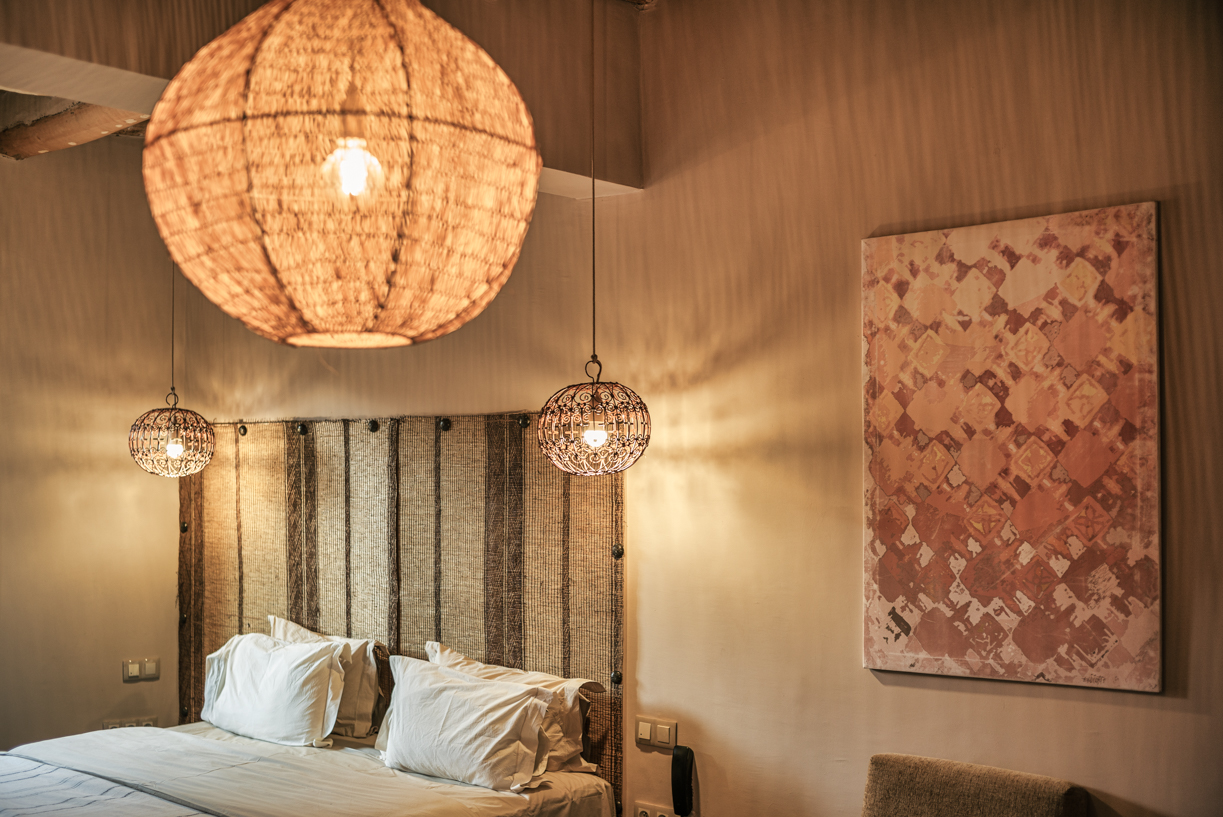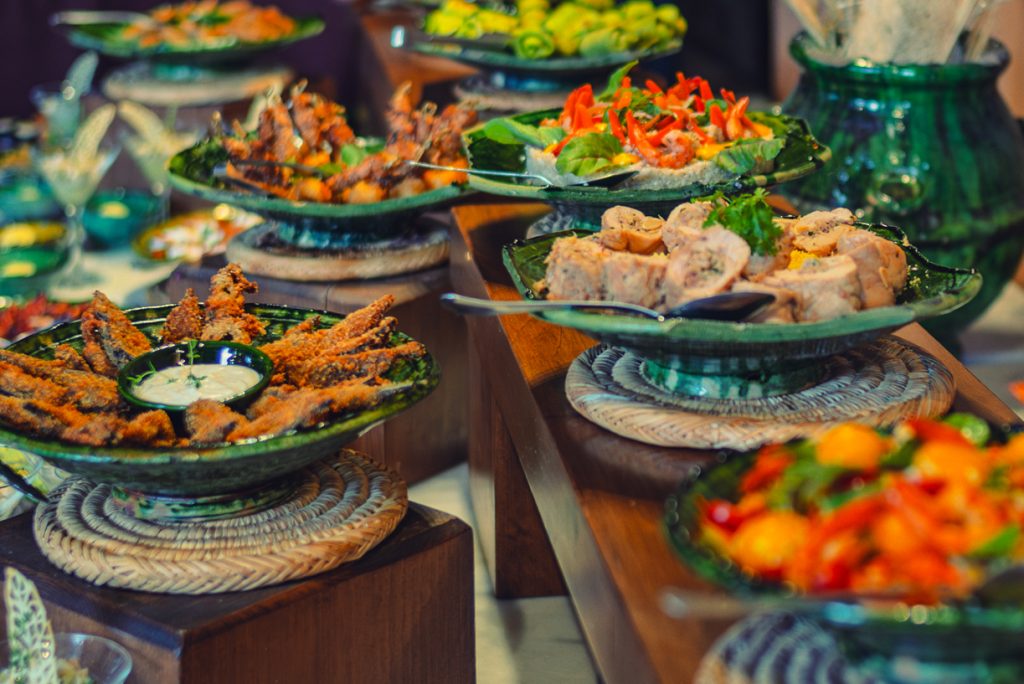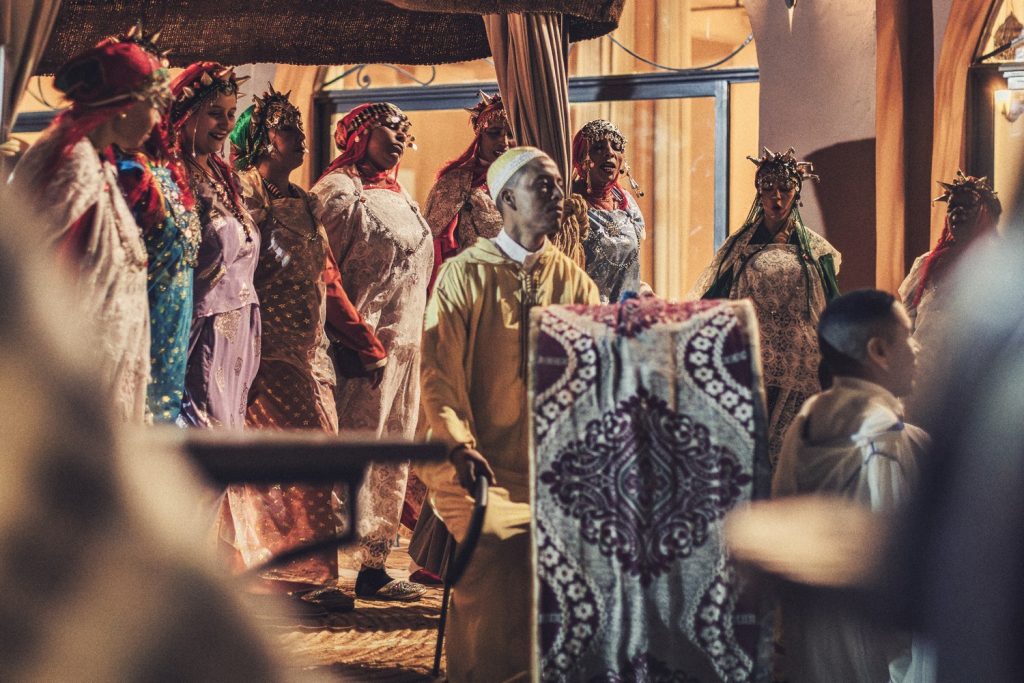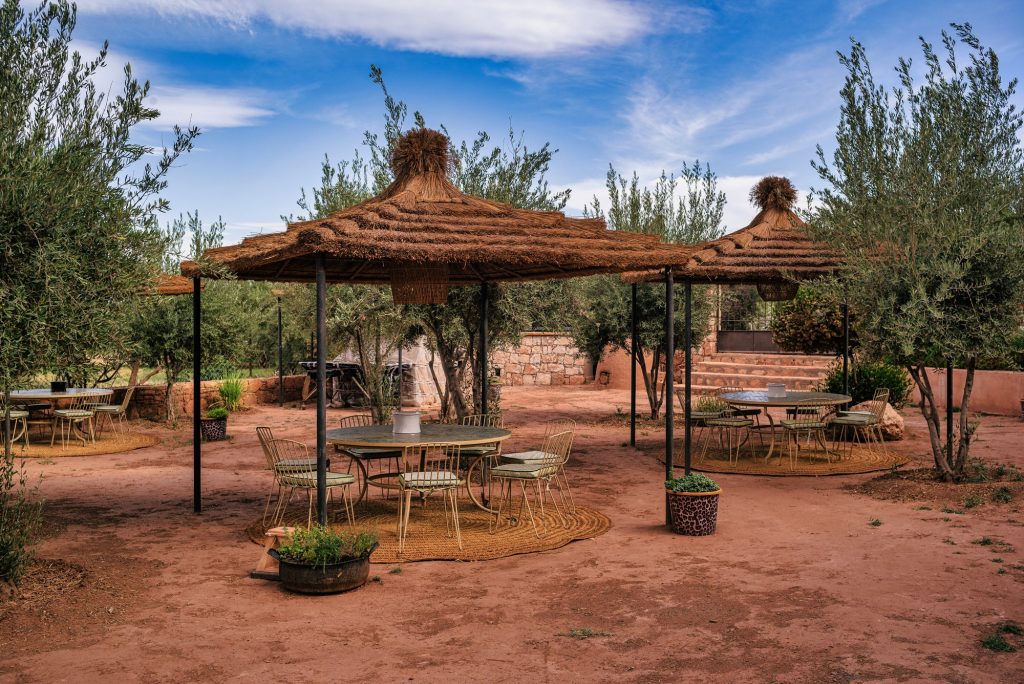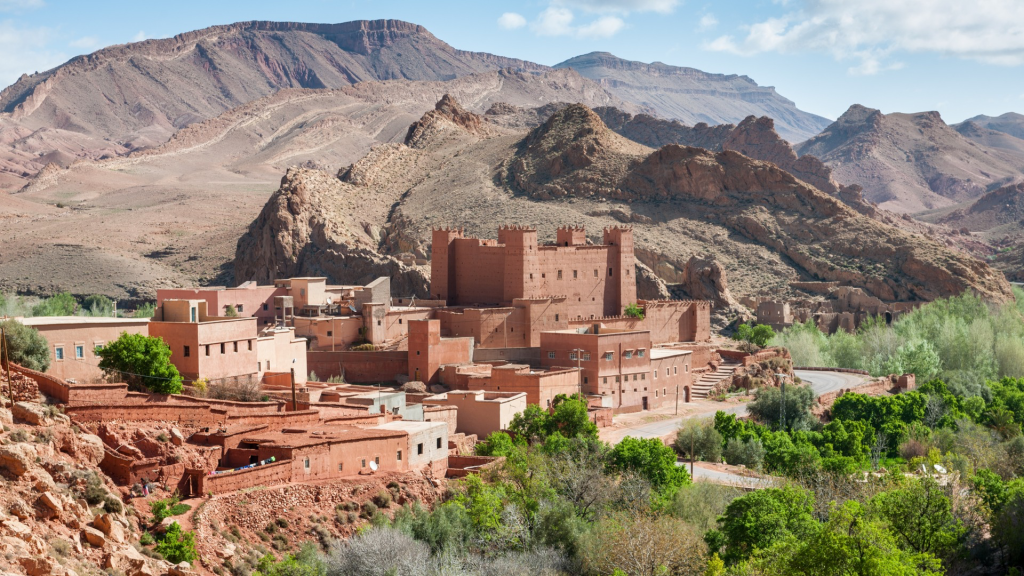The views across the valley from the flat-roofed Berber house were sublime. A meandering trail of varied hues of green flanked the M'Goun wadi, its river rendered invisible by a dense patchwork of palms, olive and fig trees, purple field gladiolus, pink roses and swathes of red poppies. The ochre turrets of kasbahs in a remote village rose from the green, dwarfed by towering copper mesas behind them, with the snow-capped Atlas Mountains in the background.
Sarah, clearly accustomed to her spectacular surroundings, unceremoniously dumped a hessian bag full of pink rose buds on the sun-baked roof and spread them evenly among hundreds of others, before turning to watch me admiring the view.
Sarah is one of several young locals who help at Hdida's Kasbah des Roses co-operative, sifting tight Damask rose buds from the pounds of blowsy pink petals harvested by local families in this small Moroccan village. The buds are dried for use in cosmetics, home decoration and cooking, while the petals are distilled into rose water and, ultimately, rose oil, a key ingredient in many of the world's perfumes and potions.
Located about six hours' drive south-east of Marrakesh, Morocco's "Valley of Roses" is as lush and fragrant as it sounds. While the labyrinthine medinas of Marrakesh, Fes and Casablanca are known the world over, few visitors to Morocco venture here, to the province of Ouarzazate (pronounced "Wazazat"). Unless they're film stars that is, as Ouarzazate is Africa's Hollywood - the desert setting for countless films including Lawrence of Arabia, Gladiator, Babel and Salmon Fishing in the Yemen.
Indeed, I wouldn't have come to Ouarzazate had it not been for an encounter with perfumer Linda Pilkington. The founder of London's opulent Ormonde Jayne perfumery, Linda scours the globe for rare ingredients with which to blend her exotic scents, tracking down small-scale producers of black irises in Jordan, heady champaca flowers in India's Indus Valley - and sweet-smelling roses in Morocco. Inspired by Pilkington's tales of rose-hunting in the Atlas and the region's intriguing-sounding Rose Festival, which takes place early each May in the 'capital' of the Valley of Roses, El Kelaa M'Gouna, I had booked my flight to Ouarzazate.
Given my horticultural intentions for the trip, I had been thrilled to discover that the celebrated French garden designer Louis Benech (whose projects include the gardens of Versailles Palace, Paris's Élysée Gardens and Pavlovsk's rose pavilion in St Petersburg) had created the gardens of Dar Ahlam Kasbah, a nine-suite, three-villa hotel squirrelled away in the palmerie of Skoura, a village in the "Valley of 1,000 Kasbahs", between Ouarzazate and the Valley of Roses. Exploring the grounds was a delight: 500-year-old olive trees shaded lines of irises, a small rose garden was a riot of colour and scent, ancient palm trees swayed gently above the large pool, and burbling streams watered a herb garden.
Meals are served whenever guests wish at Dar Ahlam, in varied, secluded and impossibly picturesque locations - breakfast might be taken at a petal-strewn table by the pool, lunch enjoyed while reclining on day beds under the dappled light of an olive grove, and dinner savoured à deux in a courtyard garden, lit by countless candles.
Wrenching myself from this idyll, I went in search of the Rose Festival. Driving through flat, arid desert, it was hard to imagine I was about to discover the seas of Persian roses described by Pilkington. However, as I approached El Kelaa M'Gouna, named after the river that feeds the Valley of Roses, the road became flanked by rose-studded hedgerows and children selling heart-shaped decorations and garlands fashioned from rose petals.
El Kelaa M'Gouna itself was humming with excitement and brimming with people. Dating from the late Thirties, when the French opened the valley's first distilleries, the festival celebrates the annual harvest with exuberant displays of Berber singing, dancing and sword-fighting, along with the coronation of a Rose Queen in a packed open-air stadium.
The streets of the town were equally busy, with hundreds of stalls selling everything from babouche slippers and silver jewellery to saffron and ice cream served in bright green, pink or orange cones. It had the air of a village fete, albeit a rather chaotic one, with men strolling around with roses tucked behind their ears and women wearing rose garlands on their heads. Although few of the street vendors were selling rose products, a dozen permanent "Boutiques des Roses" offered a dazzling array of violently pink soaps, gels, creams, sprays and oils, and mountains of dried rose buds.
Abandoning the festival, I drove deeper into the Valley of Roses to find the Kasbah des Roses co-operative, to learn about the work involved in creating the highly valuable rose oil (a teaspoon of pure rose oil costs about £70) using the traditional method of steam distillation.
Having watched Sarah fork through a vast heap of freshly harvested rose petals, separating the petals intended for distillation, I followed the maze of paths that linked the small squares of roses, gladiolus and poppies that carpet the M'Goun wadi. Pilkington was spot on with her description of Morocco's Damask roses as "really rather scruffy and frayed around the edges" - much like sweeter-smelling old English roses, they were endearingly shabby.
All too soon, my time in Ouarzazate's valleys of roses, kasbahs, olive groves and orange trees was over. Keen to enjoy a couple of days in Marrakesh before returning home, I embarked on the scenic, 125-mile drive there, passing barren desert, sleepy Berber villages and grazing camels and navigating the switchbacks of the spectacular Tichka Pass into lavender-lined gorges and fertile terraced hills.
Upon arrival in the city, I retreated to that most iconic of North African hotels, La Mamounia. Sipping a glass of mint tea in the Menzeh folly, in the tranquillity of the hotel's 20-acre gardens, I caught the scent of delicate white and pink roses, rambling up the gnarled trunks of 700-year-old olives.
I found myself thinking of Pilkington, who stayed here 10 years ago, flushed with success after tracking down a rose-oil producer for her new scent, Tolu. To travel the world hunting rare flowers, spices, seeds and berries, and to bottle those scents for others to savour, is a rare and enviable skill.
And one I'll have to rely on now, by inhaling a spritz of Tolu, to whisk me back to the fragrant foothills of the Atlas Mountains.
Getting there
Royal Air Maroc (royalairmaroc.com) offers return London-to-Marrakesh flights from £280 and to Ouarzazate, via Casablanca, from £255.
This year's Rose Festival runs from May 8-10.
For more information about travelling to Morocco, contact the Moroccan National Tourist Office (020 7437 0073; visitmorocco.com).
Packages
Timbuktu travel agency can create a bespoke Moroccan itinerary. A three-night stay in a double room at Ksar Ighndafor two people (including full board, transfers and excursions), plus two nights at La Mamouniacosts from £2,975.

